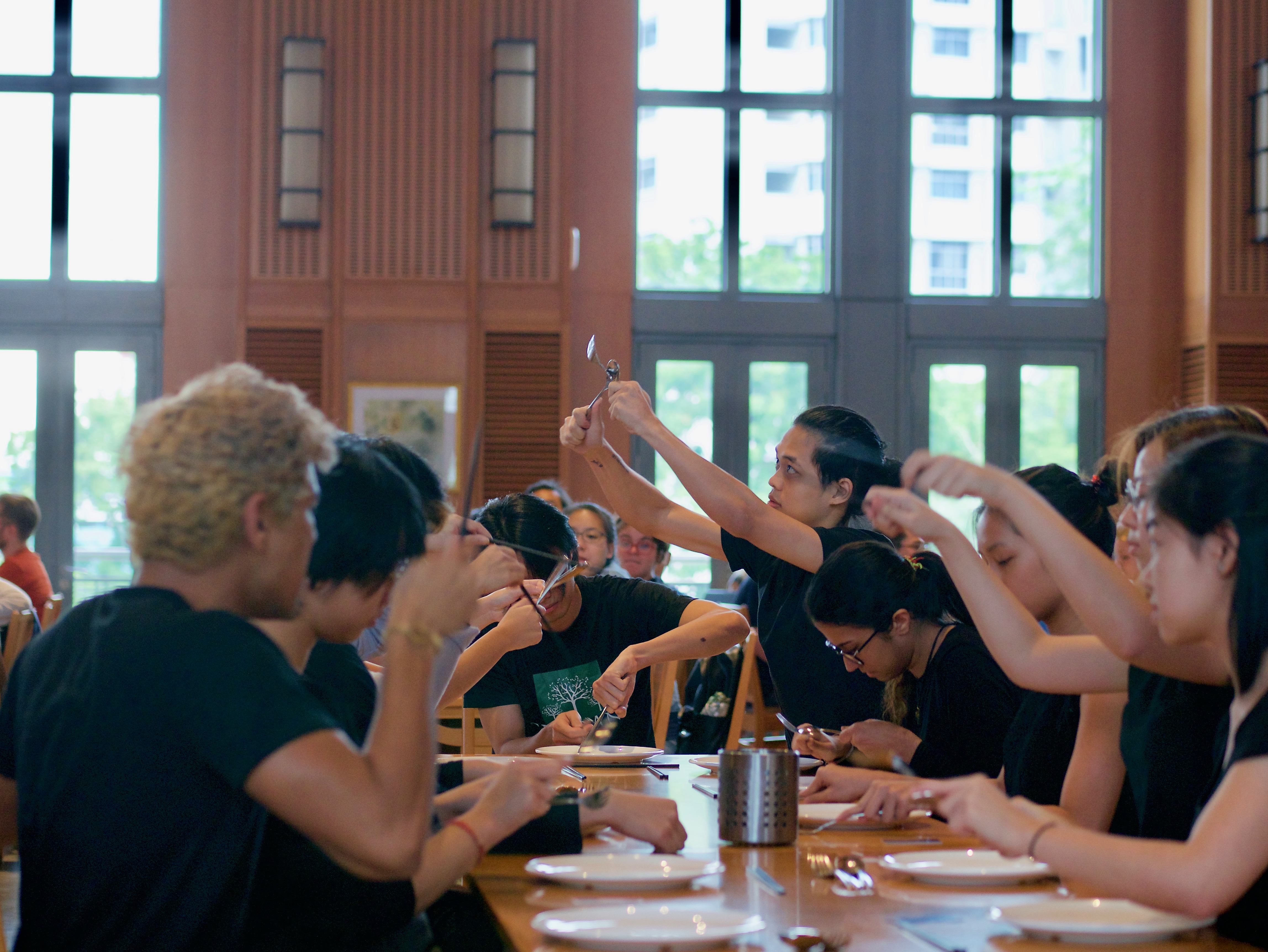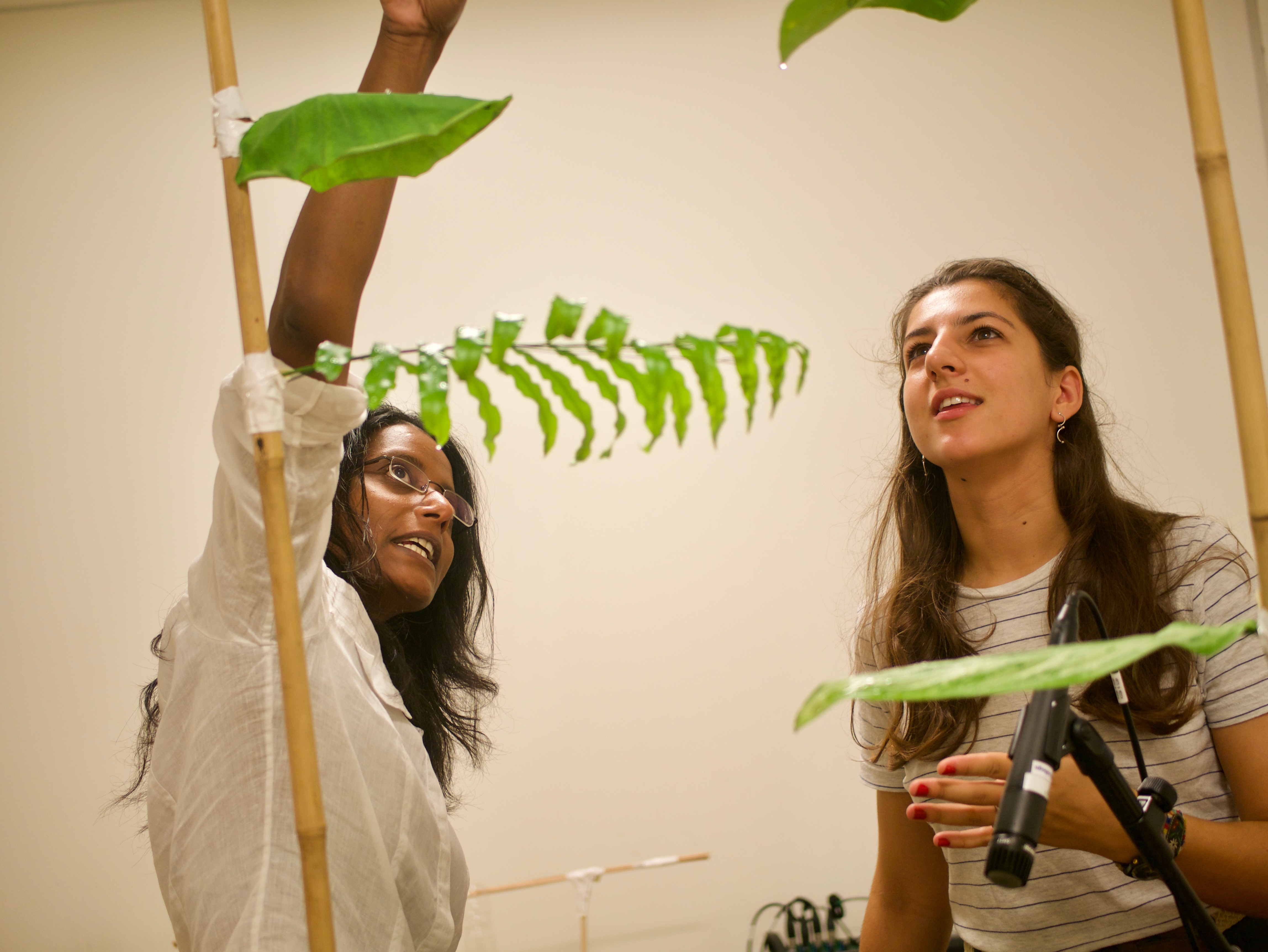Music and theatrical interplay – Yale-NUS performing arts faculty’s interdisciplinary approach to their classes

On 29 March, a dozen students abruptly marched into the Elm College dining hall and sat at a table lined with dinnerware. They then began to perform a sequence of tapping cups, scraping plates and waving chopsticks.
This lunchtime performance was part of a course co-taught by Assistant Professor of Practice Lee Chee Keng, who has a background in theatre-making and directing, and Postdoctoral Fellow Jingyin (Jon) He, whose focus is on sonic arts and integrated media. Such inter-disciplinary collaboration between faculty members has fostered a vibrant performing arts scene at Yale-NUS College, not only in student life but also amongst faculty.
Dr Lee specialises in theatre directing and actor training, which he reflects in his love of teaching. “As a director, you put your performance together, and work with actors to realise their best potential in the production, so there’s always teaching involved,” he said.
The course, ‘Performative Elements Across Space and Medium’, examined the spatial representation of sound and movement used in performances. Once students could produce different sounds from individual objects, they structured them into a performance. “Each person plays a specific role, so while there is some room for improvisation, there is also a mechanism that makes the structure repeatable,” Dr Lee explained.
The class was an example of how Dr Lee constantly innovates and tries to best position theatre within the College’s curriculum. “I try to strike a balance for my courses between experience, appreciation and skill,” he shared.
Many of the performing arts faculty also play an active role in the co-curricular programmes at the College.
Assistant Professor of Practice Nirmali Fenn led a project in Poland for this year’s Week 7, a flagship Learning Across Boundaries (LAB) programme for first-year students, along with singer and Lecturer in Voice Jassy Husk. “In music therapy, most people use activating stimulus, i.e. sounds to make people happy,” said Dr Fenn, who is a composer by training. “We’re examined whether silence, as a deactivating stimulus, may actually help in recharging memory and re-evaluating life for people.”
During the Week 7 LAB, students explored the psychology of memorial silence, through visits to the Auschwitz concentration camps of the Holocaust and the Bochnia Salt Mine, one of the oldest salt mines in the world.

Dr Fenn has also previously collaborated with faculty members outside of her domain. In the past year, she accompanied Assistant Professor of Science (Life Science) Philip Johns on a LAB to Brunei. Together, they examined the synchronisation of bird sounds, a topic that required a musician’s perspective.
Dr Fenn enjoys the interdisciplinary nature of work at the College and how faculty, who are all experts in their field, are challenged to collaborate with others from different fields and incorporate other research methodologies.
“Music is by its very nature multimodal and collaborative,” she noted, pointing to how well it works together with theatre, text and the visual arts.
Born in Sri Lanka, Dr Fenn began composing at an early age. “I hear music all the time; it’s like having a radio in my ear,” she said. Naturally, she would try to record these sounds on paper. “Composing was the only way to force myself not to remember it anymore, and hear something else,” she said.
Since completing her doctorate at Oxford University, Dr Fenn has composed for numerous orchestras and ensembles, and served as a composer-in-residence at the Lakes District Summer Music Festival in the UK, among others.
Last semester, Dr Fenn taught Living in Sound, a course she has been conceptualising since her undergraduate years. Living in Sound teaches students awareness of how sound can define spatial dimensions.
As an undergraduate, Dr Fenn was frustrated by how traditional music courses would train theory, oral, and practical skills, but neglected to teach the skill of listening as a musician.
“Musicians have a strong listening ability. Everybody naturally has it, but nobody uses it,” she said.
In her first seminar, Dr Fenn removed the furniture from the room and blindfolded the students. All of them introduced themselves and answered one question: What sound makes you creative? Dr Fenn then placed the students around the room and had them find each other through sound. The students not only learned about each other, but found they needed one another.
“That’s my purpose—I try to create families. We trust, guide, and learn from each other, both teacher and student,” she said. “In that process, our relationship with music grows.”





